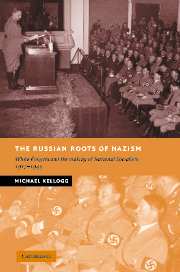Book contents
- Frontmatter
- Contents
- Acknowledgments
- List of abbreviations
- Introduction
- 1 The far right in the German and Russian Empires
- 2 At the extreme in the Ukraine and in Germany
- 3 “Hand in hand with Germany”
- 4 The international radical right's Aufbau (reconstruction)
- 5 “Germany–Russia above everything”
- 6 Conspiracies of fire and the sword
- 7 “In Quick March to the Abyss!”
- 8 The four writers of the apocalypse
- 9 Aufbau's legacy to National Socialism
- Conclusion
- Bibliography
- Index
- NEW STUDIES IN EUROPEAN HISTORY
4 - The international radical right's Aufbau (reconstruction)
Published online by Cambridge University Press: 23 July 2009
- Frontmatter
- Contents
- Acknowledgments
- List of abbreviations
- Introduction
- 1 The far right in the German and Russian Empires
- 2 At the extreme in the Ukraine and in Germany
- 3 “Hand in hand with Germany”
- 4 The international radical right's Aufbau (reconstruction)
- 5 “Germany–Russia above everything”
- 6 Conspiracies of fire and the sword
- 7 “In Quick March to the Abyss!”
- 8 The four writers of the apocalypse
- 9 Aufbau's legacy to National Socialism
- Conclusion
- Bibliography
- Index
- NEW STUDIES IN EUROPEAN HISTORY
Summary
Karl Schlögel, a German expert on White émigrés, has noted that Munich ascended to the dynamic crux of völkisch German–White émigré collaboration after the Kapp Putsch collapsed in Berlin in March 1920. Leading German and White émigré participants in the Kapp Putsch fled East Elbian Germany for Bavaria, where they quickly reorganized and found new means to further complementary right-wing German/White émigré interests. Former German and White émigré Kapp Putsch conspirators in Bavaria sent a mission under Max von Scheubner-Richter to establish clandestine military and economic relations with General Piotr Vrangel's Southern Russian Armed Forces, which were based on the Crimean Peninsula in the Ukraine. To foster the common struggle against Bolshevism, Vrangel's regime pledged to deliver large amounts of agricultural goods in return for military personnel and supplies from right-wing Bavarian circles.
The cooperation between German and White émigré rightists based in Bavaria and Vrangel proved short-lived because of the Red Army's surprisingly rapid victory over Vrangel's forces. Nonetheless, this brief German-White émigré/White connection spurred the formation of Aufbau, a conspiratorial völkisch German/White émigré organization that opposed the Entente, the Weimar Republic, Jewry, and Bolshevism. Aufbau sought to overthrow the Bolshevik regime and to set Grand Prince Kirill Romanov at the head of a pro-German Russian monarchy. Following the low point of right-wing fortunes in Germany that had been reached with the Kapp Putsch's failure, Aufbau demonstrated its resilience by rejuvenating the völkisch German/White émigré radical right on German soil in the course of late 1920 and the first half of 1921.
- Type
- Chapter
- Information
- The Russian Roots of NazismWhite Émigrés and the Making of National Socialism, 1917–1945, pp. 109 - 135Publisher: Cambridge University PressPrint publication year: 2005



